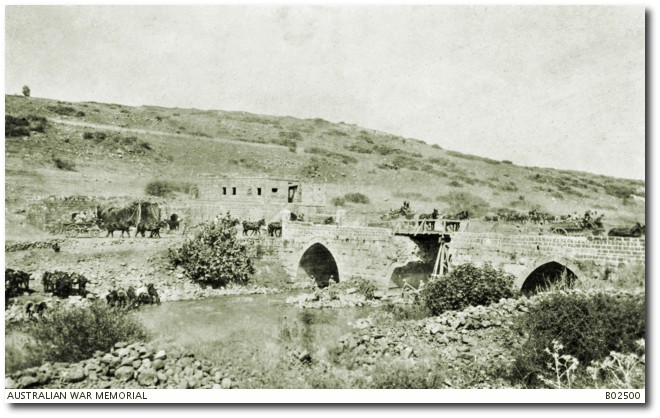
Australian Mounted Divisional Train crossing the Jordan River, Benat Yakub, Palestine, c1917. Courtesy Australian War Memorial.
Indigenous Australian, Albert Jones, Australian Mounted Divisional Train
Albert Bunda JONES was born on 1 January 1900 to Lucy Lane who resided on the Aboriginal mission at Barambah, now known as Cherbourg. Albert had been working as a stockman in Mundubbera before he volunteered to serve with the first AIF. Just 18 years old, permission was sought and granted by the Chief Protector of Aborigines.
Albert was assigned to the 6th Reinforcements for Egypt, and embarked for overseas 16 October 1918 unaware of the imminent armistice that was being brokered with the Turkish and German forces. Whilst on board the troopship HMAT Malta he was admitted to the ships hospital with influenza.
When he arrived in Egypt he was assigned to the Australian Mounted Divisional Train (AMTD) which was charged with maintaining chains of supply to troops serving in the field. The Unit diary provides details of their time in Syria and Jordan, under the command of the young Lieutenant Colonel Harold Maunder, from Brisbane.
Albert Jones remained with the AMDT, serving with several companies, until mid 1919, he returned home in September and took up employment in Maryborough in the oyster industry.
He met and married Louisa Nufong at Myora on Minjerribah (North Stradbroke Island), where they raised 9 children. Albert Bunda Jones died age 52 and is buried at the Dunwich Cemetery, Goompie.
Read more ...
- Service record: JONES, Albert
- Unit Diary: Australian Mounted Divisional Train
- North Stradbroke Island's First World War Soldiers and the Homefront
- One of the soldiers featured in SLQ’s HistoryPin Collection
- Queensland’s Indigenous Servicemen [oral history]
The information in this blog post has been researched by State Library staff and volunteers, it is based on available information at this time. If you have more information that you would like to share or further research uncovers new findings, this post will be updated.
Comments
Your email address will not be published.
We welcome relevant, respectful comments.